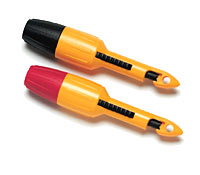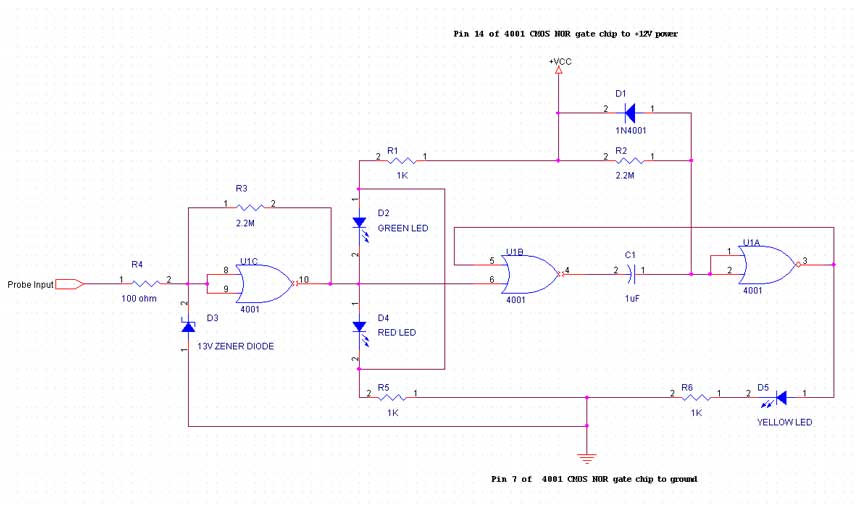Any suggestion on multi-meter?
Printed From: the12volt.com
Forum Name: Car Security and Convenience
Forum Discription: Car Alarms, Keyless Entries, Remote Starters, Immobilizer Bypasses, Sensors, Door Locks, Window Modules, Heated Mirrors, Heated Seats, etc.
URL: https://www.the12volt.com/installbay/forum_posts.asp?tid=66679
Printed Date: December 23, 2025 at 2:14 AM
Topic: Any suggestion on multi-meter?
Posted By: spooken
Subject: Any suggestion on multi-meter?
Date Posted: November 20, 2005 at 5:41 PM
Hi guys,
Not sure if this is off topic or not. Can you give me a decent Digital Multimeter for installing car alarm and perhaps in the future, car audio accessories? What kind of features do I need to look for in a DMM?
Thanks for any inputs. ^.^
Replies:
Posted By: dualsport
Date Posted: November 20, 2005 at 9:03 PM
You really don't need anything too sophisticated, I've got a bunch of meters from Harbor Freight when they had them on sale for $2.99 and they work fine for 95% of the time.
Pay more, and you'll get better test leads, (longer, more flexible, durable, etc), and better reliability, greater pride of ownership.
The cheap meter has to be used with a good battery; I noticed that if you continue to use it with a low battery indication, the measurements will be wacky. With the better units, it'll be regulated and still continue to read properly, even with a low battery.
Accuracy of pretty much any of these meters will generally exceed all the requirements for installing alarms and audio, so you don't gain much in that department in going with the ones costing hundreds of dollars. Fluke is generally a standard bearer for the quality stuff.
Some features that would be nice, though not essential, in no particular order, are backlighting, diode check, fast continuity beeper, 20A current range, on/off switch (as opposed to the rotary dial only type, which happens to be pretty much the standard), analog bar graph indication for fast moving signals, 20Mohm measurement capability, large LCD display for easy readibilty from a distance.
I have a Fluke 88, which cost more than a hundred of the cheapies, and has min/max readout, frequency and RPM measurement, inductive probe attachment, high accuracy, but I tend to use the cheap ones the most, simply because I have them laying around and on hand. When you just want to see if a signal is there, any digital meter is more than accurate enough.
The probes do make a difference in use, though. It's something like the difference a monitor and keyboard makes for a PC, but you could always get a good set of probes if you get the cheap meter.
Although the probes can easily cost several times more than the meter, with the nice silicone insulated ones. Sharp points for piercing insulation is handy too, if you have a choice, and more length is good. The cheap ones have short test leads, so it can be difficult in some situations to reach the measurement points if they're too far apart.
Posted By: dualsport
Date Posted: November 20, 2005 at 9:35 PM
Yeah, if you get only one, go for the better ones; flipping the rotary switch on the cheap one feels, well.. cheap. Go for a good primary, and then if you're so inclined, get a bunch of cheap ones to sprinkle around the shop so they're always within arms reach. And to loan to your buddies; keep your good one locked up. 
Posted By: gus1
Date Posted: November 20, 2005 at 10:46 PM
Best bang for the buck meter I have is the Fluke Model 11. Thing is so simple to use, quite accurate, and is completely fool proof. 100% auto ranging, kicks into voltage mode when it senses voltage in modes other than voltage (IE, resistance, continuity).
Best $100 I spent on tools in the past 10 Years.
Gus
-------------
Wherever I go, that is where I end up......
Posted By: dualsport
Date Posted: November 20, 2005 at 10:57 PM
Completely? How would it handle connection to the car battery terminals in the current measurement mode?
Nothing's *completely* foolproof, there's always some fool who'll come by and find a way around it- 
Neat feature with the mode switch from resistance mode, sounds handy.
I've seen probe clips that can make measurements through insulation by piercing it with a needle tip while holding the wire centered; that'd probably be handy to confirm the right wire with minimal effort.
Posted By: dualsport
Date Posted: November 20, 2005 at 11:02 PM
Anyone use a set of these, from Fluke?  Stainless steel probe pierces insulation on 14, 16 and 18 gauge wire. You control needle depth to minimize insulation damage. Essential for use under hood or under dash. Use it on fuel injectors or sensors while providing complete insulation to grounding due to design. * Banana jack accepts all DMM and banana jack leads * Non-rotating banana jack prevents leads from tangling, allowing you to tighten/loosen clamp while still connected to the test lead * For use with test leads with 2 mm probes * Tested to 60 V DC
Posted By: dualsport
Date Posted: November 20, 2005 at 11:11 PM
By the way, if you get an autoranging unit, check and see that it has a range lock to stay in a particular measurement range, like 20V. If it doesn't, it'll take a bit longer to make a measurement, since it would have to cycle down through the ranges until it gets to the target range.
If it cycles through quickly, then it won't be much of a bother, but if you need to run though a bunch of measurement points quickly, it's nice if you can lock in on the range you're looking for.
Posted By: dualsport
Date Posted: November 21, 2005 at 3:37 AM
Here's a logic probe that can be put together to use for quick high/low checks; it's powered from the 12V of the car or whatever circuit you're looking at, so you don't need batteries. The green LED lights up when the voltage is high, the red one lights when the signal is at ground, and the yellow LED lights when there's a pulsed signal present. If it's just an open circuit, all the LED's remain off. It saves time over a DMM if you're looking for a ground signal, since a DMM would show close to 0V whether it's grounded or an open; and you would also need to check for voltage first, unless you have one of those nifty meters that will automatically switch, like Gus has- If you use it to look for tach signals, it should light up the yellow LED, indicating the signal is toggling at least once every couple seconds. 
Posted By: spooken
Date Posted: November 22, 2005 at 4:05 PM
Woah... Thanks a lot for the great inputs guys! dualsport even posted a diagram, looks cool and somewhat complicated. LOL. Forgot my high school physics.
Posted By: gus1
Date Posted: November 22, 2005 at 5:41 PM
There is no current measurement on a Fluke 11.
In the many years I have owned it, it has been frozen, baked in the sun, dropped, stepped on, wet. Pretty every thing you can do to it. It is still chugging along rather nicely.
If I need to do current, I do it the alternative way. Remember ohm's law??? If you measure the voltage drop across a resistance, you can calculate current.
As far as accuracy, we aren't doing board level trouble shooting and measurement here.... if I have to fix a PCB circuit, I have a lovely lab grade benchtop DMM that I can use if need be. But who measures microvolt or milliohm differences every day anyways? A 4 digit display, and 2 decimal places is more than accurate enough for the 12V world.
Gus
-------------
Wherever I go, that is where I end up......
Posted By: dualsport
Date Posted: November 22, 2005 at 6:18 PM
You could use an external current shunt when you're measuring the voltage for the current calculation, but it's a bit of a hassle juggling the extra connections doing that. You could measure it across the actual load resistance, but that may be hard to do if you deal with loads that aren't pure resistances, and not linear. LEDs and incan lamps would give a resistance measurement that doesn't give a good indication of the actual resistance when powered up, so for those kinds of cases, a built in current mode would come in handy. Yes, very true- as far as accuracy, probably 25% would be fine, and any DMM could do that with its eyes closed and meter leads tied behind its case-  That's why I want to put the probe circuit together when I round up the parts; I think it'd be really useful for quick searches of signals. That's why I want to put the probe circuit together when I round up the parts; I think it'd be really useful for quick searches of signals.
|



